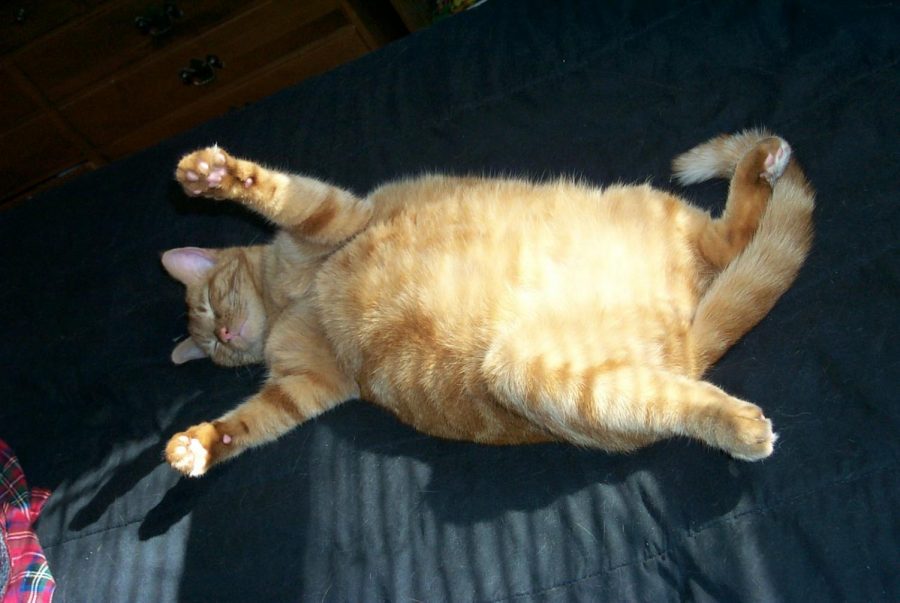Fat pets: an internet phenomenon gone wrong
Photo courtesy of creative commons
A rotund tabby cat basks in the sun after a visit to the vet on Feb. 23, 2001.
March 18, 2021
Pets are entrenched in all aspects of daily life—frolicking in the grass, starring in TikToks and sashaying down sidewalks. These beloved companions range in size and species, from tiny chihuahuas to giant rabbits, and can be seen all over the internet. Amused by their endearing actions, people find themselves smiling at the antics of a kitten or the chubby face of a pug while they scroll through Instagram. Unfortunately, these human companions are becoming increasingly unhealthy due to the normalization of fat pets, a harmful societal trend that sacrifices their quality of life and well-being for entertainment.
Over time, people have gradually disregarded their pet’s health, facilitating the infiltration of fatty pet foods and treats into the market. A lack of dietary knowledge, overfeeding of pets and unawareness of daily caloric recommendations have resulted in the prevalence of fat pets. According to the New York Times, veterinarians point to overfeeding as the greatest contributor to pet obesity and it does not seem like this will stop anytime soon.
“Free feeding,” or the propensity to overfeed pets, has mostly led to pets trending fatter over the years. As the proportion of pets becoming overweight increases, so too does the “fat pet gap,” a phenomenon describing a growing tendency for pet owners to incorrectly assume that their obese pets are healthy. According to CNN, a pet obesity study found that 22 percent of dog owners and 15 percent of cat owners made this false assumption. These facts point to the distressing conclusion that owners are paying less attention to the true needs of their pets.
Without proper labeling on pet food and the spread of accurate nutritional advice, the cultural penchant for seeing fat pets as the norm will continue to be exacerbated. The Association for Pet Obesity Prevention 2018 survey revealed that over half of cats and dogs are considered overweight or obese. Not only did this survey display the concerning levels of unhealthiness among pets, but it also showed that both pet owners and veterinarians alike struggled to help pets achieve healthy, ideal weights.
Fat pets may seem cute due to human obsession with squishy and helpless animals, but higher risks for cardiovascular disease and diabetes are nothing to adore. Physics teacher Michael Willard said, “At first glance, the images may bring a smile to your face, but I think it does set a bad precedent.” Owners should take more responsibility for their pets and aim to maximize their happiness, incorporating more playtime and nutritious diets into daily routines. Willard said, “From an ethics standpoint, a pet owner is to provide care and shelter for the pet. By overfeeding the pet, the owner is causing inadvertent harm.”
One of the most concerning aspects of pet obesity is the heightened risk for various illnesses. A fat pet is more likely to contract ailments such as arthritis, kidney disease and certain cancers according to DoSomething.org. Any kind of sickness in pets can be stressful and heartbreaking for owners, especially knowing the disease could have been prevented. Junior Kara Venditti said, “In my opinion, while some people may think that having a ‘chonky’ cat is cute, I view it as concerning, especially because my cat Cheddar was a fat cat, then got type 2 diabetes and suffered through ketoacidosis.”
The strain of maintaining and paying for treatments is a heavy burden for pet owners. Some owners may become inclined to let their pet’s health deteriorate in hopes of tapping into the fat animal-obsessed social media audience. And even for those trying to make effective changes in their pet’s lives, smaller portions or special feeding bowls are insufficient. The normalization of fat pets must be stopped before the pet obesity epidemic grows uncontrollable.
Fat pets may seem content with their obesity and pampered lives. But in truth, they could be suffering from a myriad of health issues that leads to agonizing pain or early deaths. Blatant disregard for pet health and the normalization of obese pets reduces what was once a loving human-animal relationship to a near abusive one.


